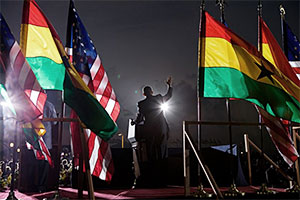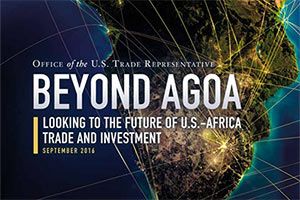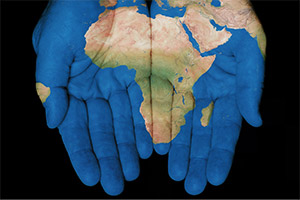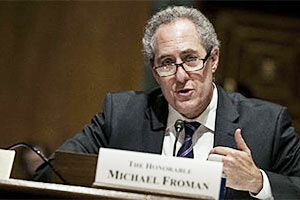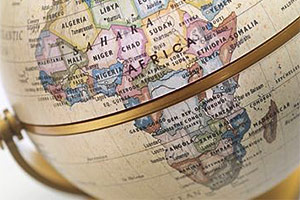US-Africa trade relationship in focus at AGOA Forum
On 22-26 September, African and US ministers, trade officials, civil society, and business sector representatives gathered in Washington D.C. to discuss the implementation of the African Growth and Opportunity Act (AGOA) at the 15th AGOA Forum. Held once a year, the event gives all stakeholders the opportunity to exchange on potential avenues for enhancing US-Africa economic ties.
The AGOA is a unilateral scheme of preferences which was first established in 2000, and has constituted since then the cornerstone of trade relations between the US and sub-Saharan Africa. It grants eligible African countries duty-free access to the US markets on nearly 6,500 products.
The preference regime was renewed last year for an additional period of ten years, much to the satisfaction of many observers in Africa, although certain provisions included in the new law were criticised by some (see Bridges Africa, 3 September 2015). The renewed version is thus set to expire in 2025.
This year’s edition of the forum was organised under the heading “Maximizing US-Africa Trade and Investment; AGOA and Beyond.” It further provided an opportunity for participants to touch upon the sensitive question of determining how to update trade and investment relationships between the US and sub-Saharan Africa once the AGOA extension reaches an end in 2025.
Taking full advantage of AGOA
Despite the significant opportunities offered by the AGOA framework, trade between the US and sub-Saharan African countries has not been performing as hoped in recent years. After reaching a US$100 billion peak in 2008, it took a hard blow in 2009 due to the repercussions of the global financial crisis. The following period saw an encouraging recovery, but commercial exchanges started declining again in 2011 mostly due to the contraction in oil imports in the US. As of end-2015, trade between the US and AGOA countries had been declining for four successive years, reaching a new low of US$ 36 billion in 2015 (see Bridges Africa, 22 February 2016).
In a recent interview with RFI, the Secretary General of the UN Economic Commission for Africa, Carlos Lopes, summarised this situation in a blunt way. “We can say that the AGOA is an expression of political good will on the part of the US towards Africa, but we cannot say that the results have been very positive,” said Lopes.
On the positive side, non-oil exports from sub-Saharan African countries to the US have increased since the creation of AGOA, with apparel and transport equipment among the most promising sectors. As regards apparel, many observers lauded the fact that the renewed version of AGOA also renewed the third country fabric provision – a special rule allowing African apparel exports to the US to remain eligible under AGOA even when the fabrics used in producing those goods are imported from non-AGOA countries.
Recognising AGOA’s mixed track record, several participants to the 15th AGOA Forum emphasised the need for the US and African countries to work on potential ways for the latter to reap greater benefits from AGOA preferences.
“We must take effective steps to address the challenges that impede our ability to exploit the huge market access offered by AGOA,” said Amina Mohamed, the Kenyan Cabinet Secretary for Foreign Affairs, in her opening remarks to the forum.
Michael Froman, the US Trade Representative, also acknowledged that “the full potential of AGOA has not yet been fully reached,” underlining that the countries benefitting from the AGOA “only claim preference on a fraction of the nearly 6,500 eligible tariff lines,” with only a few countries making use of the regime provisions in the apparel sector.
“We need to find ways to change that. Although sub-Saharan Africa now exports more in absolute terms to the United States than it did in 2000, Africa’s share of U.S. imports is still only one percent,” Froman said to the audience.
In order to improve this and boost US-Africa exchanges under AGOA, observers have repeatedly insisted in recent years on the need to strengthen supply-side capacities in African countries, which also necessitates appropriate international support.
The new version of AGOA, like the previous one, calls upon eligible African countries to put in place biennial utilisation strategies with a view to increasing their utilisation rates of the preference scheme. According to Froman, both the USAID Trade and Investment Hubs and the work carried out by the African Development Bank could support those strategies.
“In this respect, our focus for the next few years should be on implementation of the national response strategies as well as enhanced capacity building to ensure full utilization of AGOA,” said Mohamed.
According to Carlos Lopes, a potential avenue to consider would also be for African countries to create synergies between China’s economic engagement on the continent and the export opportunities offered by the AGOA regime (see also Ancharaz, Bridges Africa, 15 September 2016).
“If African countries play their cards right, they can benefit from the fact that the Chinese are willing to relocate a portion of their production due to labour costs and finance the setting up of a certain capacity, in particular in the textile sector, while at the same time benefitting from AGOA as a final destination for a part of their production,” said Lopes.
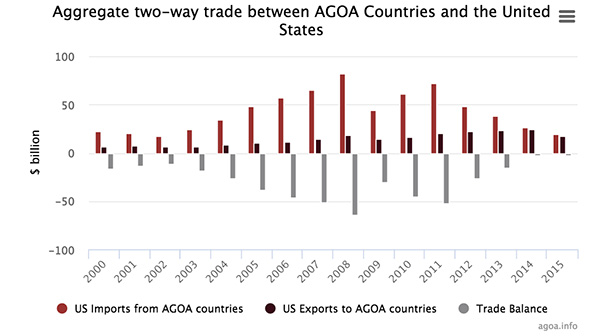
Beyond AGOA
The discussions on the new shape US-Africa trade relations could take following AGOA expiration in 2025 were informed by a recent report – “Beyond AGOA: Looking to the Future of U.S.-Africa Trade and Investment” – issued by the US Trade Representative and unveiled by US President Barack Obama at the US-Africa Business Forum on the margins of the last UN General Assembly.
As indicated in a press release by the Office of the US Trade Representative, the report “outlines key trends in the global trading system against which U.S.-sub-Saharan Africa engagement should be viewed, explores the substantive building blocks potentially important to a new U.S.-Africa trade architecture, and assesses some strategic and structural options for moving forward.”
The document explores potential pros and cons of various approaches that could be used post-2025 to structure – or restructure – the trade and investment relationship between the US and sub-Saharan Africa, including “traditional” US trade agreements, alternative reciprocal agreements (such as the Economic Partnership Agreements or EPAs), collaborative arrangements, and unilateral preferences.
The report also emphasises six key principles that should guide the future policy architecture: (1) support African regional economic integration; (2) move towards greater reciprocity; (3) support African value-added production and promote diversification of exports; (4) include African reforms across a broad range of policy areas; (5) promote African integration into the global trading system; and (6) account for different levels of readiness and capacity across the region.
In his remarks at the AGOA Forum, US Trade Representative Michael Froman echoed these principles, while underlining that it is in the interest of both the US and sub-Saharan Africa to allow their economic engagement to evolve in light of new realities. “It is in our mutual interest to find ways to adapt our trade and investment framework to the times,” he said.
In particular, Froman emphasised that as regional and bilateral preferential trade agreements proliferate around the globe, the benefits that African countries are able to reap from tariff preference schemes will certainly wane – a process commonly referred to as “preference erosion.”
“That we must take this partnership to a higher, more stable, more predictable level is not the question. The question will always be what formula we use and how to make the relationship equitable,” reminded Amina Mohamed.
On that matter, Froman indicated that the US “deliberately chose not to prescribe a particular outcome,” indicating that the Beyond AGOA report only constitutes “the start of a vital conversation.”
ICTSD reporting.





